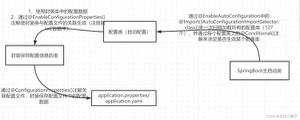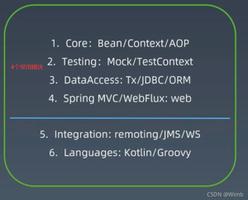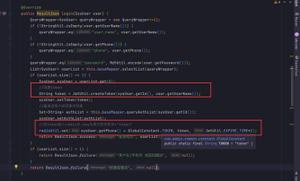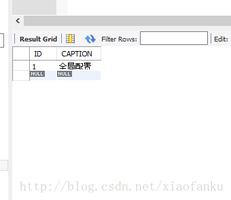Spring 中基于 AOP 的 XML架构的一个实例
本文内容纲要:
- 1.第一步:创建一个新项目,首先导入spring 所需的核心jar和AOP的所需要jar。 我这里已经打包好了- 2.第二步:定义三个类
- 3.第三步:配置spring.xml文件,注意头文件跟之前spring的头文件有些区别,复制我这个就可以了。这里的其他通知方法我注释了,只留前置通知
- 4.最终的目录结构,只看标注红色的地方就可以了
- 5.运行结果 因为开了前置通知,和printAdvice方法,所以它先出前置通知然后再显示调用方法
- 6.如果是用的maven,添加下面的pom.xml文件即可
-
- 结果也可以出来,不过要注意:
Spring 中基于 AOP 的 XML架构,我们来做第一个AOP实例
1.第一步:创建一个新项目,首先导入spring 所需的核心jar和AOP的所需要jar。 我这里已经打包好了
spring 所需的核心jar和AOP的所需要jar: spring 所需的核心jar和AOP的所需要jar
Spring AOP实例: Spring AOP实例
在项目下创建一个lib文件夹,把jar包复制到这个文件夹中。——》选择jar包Build path,把jar包环境加载到java虚拟机中去
如图:
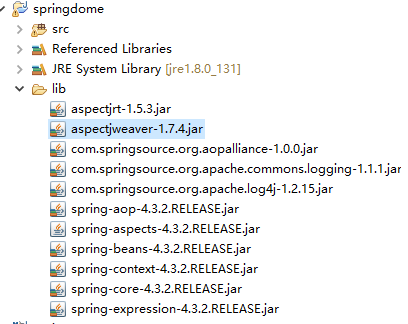
2.第二步:定义三个类
2.1第一个Student类(包含学生姓名name,和学生年龄age)
1 package com.spring.aop1; 2
3 public class Student {
4 /**
5 * 定义学生类
6 */
7 private String name;
8 private Integer age;
9
10 public String getName() {
11 return name;
12 }
13
14 public void setName(String name) {
15 this.name = name;
16 }
17
18 public Integer getAge() {
19 return age;
20 }
21
22 public void setAge(Integer age) {
23 this.age = age;
24 }
25
26 public void printAdvice() {
27 System.out.println("name:" + name + ",age:" + age);
28
29 }
30
31 }
2.2第二个类SeizedAdvice是我们要定义通知方法的类
1 package com.spring.aop1; 2
3 public class SeizedAdvice {
4 /**
5 * 定义通知
6 */
7
8 public void beforeAdvice(){
9 System.out.println("——————我是前置通知————————");
10
11 }
12 public void afterAdvice(){
13 System.out.println("------我是后置通知-------");
14
15 }
16 public void afterReturningAdvice(Object object){
17 System.out.println("————————我是返回后通知——————————"+object.toString());
18
19 }
20 public void afterThrowingAdvice(IllegalAccessError illegalAccessError){
21 System.out.println("--------我是异常返回异常返回通知---------"+illegalAccessError.toString());
22
23
24 }
25
26
27
28 }
2.3第三个类就是测试类main
1 package com.spring.aop1; 2
3
4
5 import org.springframework.context.ApplicationContext;
6 import org.springframework.context.annotation.AnnotationConfigApplicationContext;
7 import org.springframework.context.support.AbstractApplicationContext;
8 import org.springframework.context.support.ClassPathXmlApplicationContext;
9
10 public class Main {
11 /**
12 * author:
13 * mail:2536201485@qq.com
14 * 时间:
15 */
16
17 public static void main(String[] args) {
18 ApplicationContext applicationContext=new ClassPathXmlApplicationContext("spring_xml/springAop.xml");
19 Student student=(Student)applicationContext.getBean("Student");
20 student.printAdvice();
21 }
22
23 }
3.第三步:配置spring.xml文件,注意头文件跟之前spring的头文件有些区别,复制我这个就可以了。这里的其他通知方法我注释了,只留前置通知
<?xml version="1.0" encoding="UTF-8"?><beans xmlns="http://www.springframework.org/schema/beans"
xmlns:xsi="http://www.w3.org/2001/XMLSchema-instance" xmlns:aop="http://www.springframework.org/schema/aop"
xsi:schemaLocation="http://www.springframework.org/schema/beans
http://www.springframework.org/schema/beans/spring-beans-4.3.xsd
http://www.springframework.org/schema/aop
http://www.springframework.org/schema/aop/spring-aop-4.3.xsd ">
<!-- 配置aop代理 -->
<aop:config>
<!-- 配置切面, 通常是一个类,里面可以定义切入点和通知 id:取名 ref:关联 到那个bean -->
<aop:aspect id="myAspect" ref="SeizedAdvice">
<!-- 定义一个切入点 并给切入点起名为myPointCut execution:是方法运行;第一个*代表作用域修饰符,如public,也可以不写,用*代表任意值;
com.spring.aop1.*.*(..)代表着aop1包下的任意类、任意方法、任意参数个数 通俗的就是在哪些目标中做什么 -->
<aop:pointcut expression="execution(* com.spring.aop1.Student.printAdvice(..))"
id="myPointCut" />
<!-- pointcut-ref:指定切点通俗点就是在这类中将要做些什么 method:方法 -->
<aop:before pointcut-ref="myPointCut" method="beforeAdvice" />
<!-- <aop:after pointcut-ref="SeizedAdvice" method="afterAdvice" />
<aop:after-returning pointcut-ref="SeizedAdvice"
returning="object" method="afterReturningAdvice" />
<aop:after-throwing pointcut-ref="SeizedAdvice"
throwing="illegalAccessError" method="AfterThrowingAdvice" /> -->
</aop:aspect>
</aop:config>
<!-- 配置bean -->
<bean id="Student" class="com.spring.aop1.Student">
<property name="name" value="张三"></property>
<property name="age" value="23"></property>
</bean>
<bean id="SeizedAdvice" class="com.spring.aop1.SeizedAdvice"></bean>
</beans>
4.最终的目录结构,只看标注红色的地方就可以了
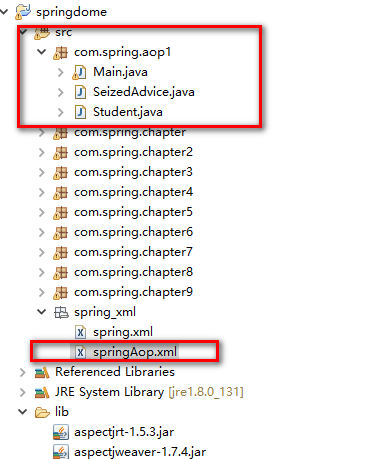
5.运行结果 因为开了前置通知,和printAdvice方法,所以它先出前置通知然后再显示调用方法

6.如果是用的maven,添加下面的pom.xml文件即可
<project xmlns="http://maven.apache.org/POM/4.0.0" xmlns:xsi="http://www.w3.org/2001/XMLSchema-instance" xsi:schemaLocation="http://maven.apache.org/POM/4.0.0 http://maven.apache.org/xsd/maven-4.0.0.xsd">
<modelVersion>4.0.0</modelVersion>
<groupId>jar</groupId>
<artifactId>jar</artifactId>
<version>0.0.1-SNAPSHOT</version>
<description>Maven项目测试</description>
<dependencies>
<dependency>
<groupId>aspectj</groupId>
<artifactId>aspectjweaver</artifactId>
<version>1.5.3</version>
</dependency>
<dependency>
<groupId>aspectj</groupId>
<artifactId>aspectjrt</artifactId>
<version>1.5.3</version>
</dependency>
<dependency>
<groupId>aopalliance</groupId>
<artifactId>aopalliance</artifactId>
<version>1.0</version>
</dependency>
<dependency>
<groupId>cglib</groupId>
<artifactId>cglib-nodep</artifactId>
<version>3.2.0</version>
<scope>test</scope>
</dependency>
<dependency>
<groupId>log4j</groupId>
<artifactId>log4j</artifactId>
<version>1.2.17</version>
</dependency>
<dependency>
<groupId>org.springframework</groupId>
<artifactId>spring-aop</artifactId>
<version>4.3.2.RELEASE</version>
</dependency>
<dependency>
<groupId>org.springframework</groupId>
<artifactId>spring-aspects</artifactId>
<version>4.3.2.RELEASE</version>
</dependency>
<dependency>
<groupId>org.springframework</groupId>
<artifactId>spring-beans</artifactId>
<version>4.3.2.RELEASE</version>
</dependency>
<dependency>
<groupId>org.springframework</groupId>
<artifactId>spring-context</artifactId>
<version>4.3.2.RELEASE</version>
</dependency>
<dependency>
<groupId>org.springframework</groupId>
<artifactId>spring-core</artifactId>
<version>4.3.2.RELEASE</version>
</dependency>
<dependency>
<groupId>org.springframework</groupId>
<artifactId>spring-expression</artifactId>
<version>4.3.2.RELEASE</version>
</dependency>
</dependencies>
</project>
结果也可以出来,不过要注意:
** 1.jar文件的版本问题,可能会导致冲突报错,这时还包版本就可以了**
** 2.当定义通知时避免通知全部加上,如前置通知和异常通知都想显示,就会报错。**
** 3.最容易出错也就是xml文件中去定义aspect切面,切点。别忘了配置相应的Bean。**
本文内容总结:1.第一步:创建一个新项目,首先导入spring 所需的核心jar和AOP的所需要jar。 我这里已经打包好了,2.第二步:定义三个类,3.第三步:配置spring.xml文件,注意头文件跟之前spring的头文件有些区别,复制我这个就可以了。这里的其他通知方法我注释了,只留前置通知,4.最终的目录结构,只看标注红色的地方就可以了,5.运行结果 因为开了前置通知,和printAdvice方法,所以它先出前置通知然后再显示调用方法,6.如果是用的maven,添加下面的pom.xml文件即可,,结果也可以出来,不过要注意:,
原文链接:https://www.cnblogs.com/ysource/p/12855333.html
以上是 Spring 中基于 AOP 的 XML架构的一个实例 的全部内容, 来源链接: utcz.com/z/296736.html



